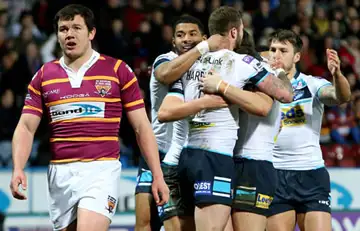Forty-20 Column: The Golden Point debate

It’s the American’s fault, everything has to be black and white with a discernible outcome, the ‘enemy’ identified and beaten.
It is they, in college football, who coined the phrase in sport, ‘it’s a bit like kissing your sister’ to describe a contest without a winner – the draw, and why it has never been worth trying to explain long-form cricket to them.
I’d been ambivalent to the introduction of Golden Point into regular season games until the other week.
In Super League Round Four Huddersfield Giants and Leeds Rhinos fought out a tenacious 12-draw and it was all very nice, backslaps all round, everyone deserved something out of the game, all equally satisfied that some reward had come from their efforts….
The following morning Melbourne Storm edged Manly Sea Eagles by a Golden Point in extra-time and the relentless drama had a resolution, a talking point, a climax, a winner and a loser – and isn’t that the very essence of sport?
It certainly has to be a whole lot better than giving defeated teams a ridiculous bonus point for not being ‘too bad.’
There has to be heartbreak and glory for sport to have the richest, most intense meaning and rivalry – elation and despair for players and fans alike.
Opponents say the Golden Point makes the game degenerate into a ‘drop-goal-a-thon’, but isn’t that exactly what happened at the John Smith’s Stadium in the closing seven minutes, with a similar number of attempts across the sides missed?
Setting up for it, or attempting to prevent it, is a skill in itself and what of those sides who have the courage to back themselves and go for the unexpected ‘golden try’ while their opponents are set for something else – it’s heightening the excitement.
Because of TV schedules, there is a finite time for Golden Point too. It’s an extension to get an outcome and if, as in both the NRL and NFL, that added time runs out, you can still have a draw.
And of course, being rugby league, there is an anomaly anyway, we already have it in cup ties and play-off matches, so let’s just extend it to all games.
PHIL CAPLAN
How often do we hear it? Rugby league is renowned for innovation.
Which is, of course, just another way of saying that we can’t resist faffing about with it.
Everything must change and moving with the times is good, especially when addressing a proven fault. Who could dislike the 40/20 – or is it Forty-20?
But too much change and you can rock a sport’s very foundations, invite accusations of gimmickry and undermine self-confidence.
As Warrington coach Tony Smith put it last year: “I’m over the innovative tag for rugby league. What about being stable, strong and consistent?”
Exhibit one: The Golden Point, a common sight in the NRL that some would like to see in Super League.
Again, don’t get me wrong. Ensuring a winner and a loser can be exciting, in the way that a penalty shoot-out is a thrill for folk who don’t really like football, or hearing who won ‘Big Brother’ afterwards is far preferable to enduring the whole thing.
But assuming you actually enjoy rugby league – the grittiness of it, the demands it makes on its athletes over 80 bruising minutes, the part stamina plays – then what is wrong with a hard-earned draw?
There’s a natural justice in two teams who can’t be separated sharing a point, isn’t there? And justice is an important quality in sport.
A fair outcome is never guaranteed, true. Luck, good and bad, plays its part. But justice is one thing every right-minded fan, player and coach respects, even when their team loses because of it.
In any case, it may be too late. Word Down under is that the NRL’s latest wheeze – stopping the clock when the ball is out of play in the last five minutes – may spell the end of Golden Point. Climaxes are now thrilling enough.
No, we should continue to do things our own way. Wouldn’t that be an innovation?
TONY HANNAN
Forty-20 – the alternative voice of Rugby League – is available on the 13th day of every month from WH Smiths, ASDA and local shops. Or subscribe at www.scratchingshedpublishing.com